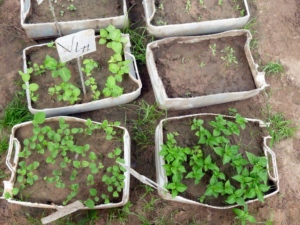“Our farmers are getting excited to try the new package, especially the women. Some who had given up on the possibility of being able to grow vegetables in their villages are now regaining hope!”
myAgro is excited to be providing a new vegetable package as an option to farmers in Senegal. Vegetables are very important to diversify the diets and  provide important nutrients to our farmers. They are also a key way to help farmers raise their revenues during the dry season when they can’t cultivate most of their typical crops. Nevertheless, farmers often face obstacles that prevent them from growing vegetables in their villages. Most farmers don’t have running water available so they have to haul water from deep wells during the dry season. This is time and labor intensive for farmers and difficult for them to water plots often enough. So how can the average farmer continue to make money and feed her family during the dry season? myAgro’s vegetable packet is making it easier.
provide important nutrients to our farmers. They are also a key way to help farmers raise their revenues during the dry season when they can’t cultivate most of their typical crops. Nevertheless, farmers often face obstacles that prevent them from growing vegetables in their villages. Most farmers don’t have running water available so they have to haul water from deep wells during the dry season. This is time and labor intensive for farmers and difficult for them to water plots often enough. So how can the average farmer continue to make money and feed her family during the dry season? myAgro’s vegetable packet is making it easier.
As usual, every packet that farmers pay in advance includes training and follow-up, including the new vegetable packet. When the farmers who choose this option receive their vegetable seeds and fertilizer in February, our field agents will train each of them on our method for planting. We then teach them how to begin planting the vegetable seeds in seedbeds, made from any container easily available to the farmers. In our test plot we have been using 10-liter jugs cut in half that are commonly found all over Senegal. After a few weeks, the seedlings are transferred into larger plots in the ground shaped like a waffle. This technique helps farmers use the minimum amount of water to keep the maximum amount of moisture. The small seedbeds can be easily watered with small quantities of water while the waffle shape of the larger plots helps keep the maximum amount of moisture around the seeds rather than dispersing. Our farmers are getting excited to try the new package, especially the women. Some who had given up on the possibility of being able to grow vegetables in their villages are now regaining hope!